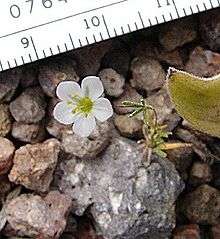Leptosiphon septentrionalis
| Leptosiphon septentrionalis | |
|---|---|
 | |
| Scientific classification | |
| Kingdom: | Plantae |
| (unranked): | Angiosperms |
| (unranked): | Eudicots |
| (unranked): | Asterids |
| Order: | Ericales |
| Family: | Polemoniaceae |
| Genus: | Leptosiphon |
| Species: | L. septentrionalis |
| Binomial name | |
| Leptosiphon septentrionalis (H.Mason) J.M.Porter & L.A.Johnson | |
| Synonyms | |
|
Linanthus septentrionalis | |
Leptosiphon septentrionalis is a species of flowering plant in the phlox family known by the common name northern linanthus.
Distribution
The plant is native to western North America, from 2,000–3,000 metres (6,600–9,800 ft) in elevation. It is found in Western Canada, the Northwestern United States, and the Great Basin region in eastern California, Nevada, and Utah.
It grows in several types of habitat, including sagebrush scrub, Pinyon-juniper woodlands, and Yellow pine forests.
Description
Leptosiphon septentrionalis is a small annual herb producing a hairy, threadlike stem up to 30 centimetres (12 in) tall. The leaves are divided into tiny threadlike lobes.
The inflorescence is generally made up of a single funnel-shaped flower with a yellow throat and a tiny white or pale blue corolla less than 1 centimetre (0.39 in) wide. The bloom period is May to July.
External links
- Calflora Database: Leptosiphon septentrionalis (Northern linanthus)
- Jepson Manual eFlora (TJM2) treatment of Leptosiphon septentrionalis
- USDA Plants Profile for Leptosiphon septentrionalis (northern linanthus)
- UC CalPhotos gallery: Leptosiphon septentrionalis